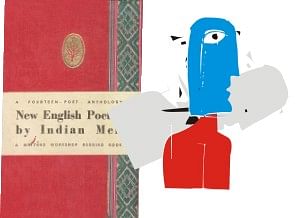Indian Poetry of the Seventies

This volume - New English Poetry by Indian Men - came into this reviewer's hands by chance, and evoked immediate curiosity, not only for its provocative title but because it afforded a look at English poetry by Indians during the '70s, when the poets were still feeling their way around. It was published by Writers Workshop of Kolkata in 1978, the companion volume to the previous year's publication containing women poets - a volume I have not yet been able to locate. This volume showcased the works of thirteen Indian poets writing in English: Pranab Chatterjee, Deb Kumar Das, V Kandaswami, Randhir Khare, R Rabindranath Menon, Moni Moulik, S Padmanab, Rakshat Puri, S Ramnath, S V Ramachandra Rao, Santan Rodrigues, Mukul Sharma and Thambi Srinivasan.
It is an uneven collection of poetry, with some of the poets later fading away, and some continuing to write. But the greatest interest in the poems lies in the fact that poetry, like any other writing, reflects its times and an age's urgencies. Just as the '60s and 1971 in the then East Pakistan and later Bangladesh produced a unique body of protest and war poems, the poems here, like the collection itself, like the title, is very much a product of theIndia of the late '70s, when slogans like 'India Shining' were unthinkable, when the great Indian middle class had not become so enamoured of consumerism and Western fashions, when Bangalore was just Bangalore and not some synonym for 'swinging city' or 'happening place', when dustbins were dustbins and ragpickers were more noticeable. When being Indian implied something very different and the Indian sense of self was rooted in something very different from today. It was also a period when Nehruvian socialism and Gandhism came under attack by Indira Gandhi's declaration of Emergency. Internationally, fights were going on against colonialism, notably the Cuban effort against mercenaries and the Portuguese in Africa. There were hippies, Ginsberg, the Vietnam War and the raw wounds of CIA and Allende. All these things influenced poetic mood and themes, however indirectly. It was a time when English itself was viewed in the subcontinent, and therefore used, very differently.
It is fairly safe to say that this kind of English poetry, with its unique diction and ebb-tide, will never be written again by Indian men. Or women, for that matter.
Below are reprinted some poems.
What Is A Year?
Mukul Sharma
What is a year?
Years pass. I go on
a little worn.
My edges fray.
Skin gets torn.
I think of you when the cold rain falls
Huddling to myself
Rubbing palms
Sucking air in through my teeth
Feeling small useless and scared.
Like the smile on your face that froze.
The Family's Politician
Santan Rodrigues
"on the seventh day thou
shall rest" and still under
the influence of my mother's
bible reading i leave my
working site to spend a
weekend with my wife and
two children, garlanded by her
arms, i arrive to the two-
mouthed gun salute of "dad-dy
dad-dy". it's like getting back
to your constituency after
a five-year term to seek
re-election as your wife
and children like honest voters
remind you of promises
made before the previous
departure. then there are
bills and bills and budgets
have failed again and
the wife's kitchen demands
more pay while the kids
want to keep ahead of
spiralling prices and you
like a politician promise over again.
The Winterbird Walks .12
Deb Kumar Das
A Moment, says Nagarjuna,
Glows with greater brightness
If its moment-ness
Is momentary.
House Moving
Rakshat Puri
It is a delicate operation, needing
a sensitive touch and a firm
grasp. You feel your roots
gently, and without the slightest
faltering you shift the heavy stuff
first of all, then the middling items,
coming last to the flooring, uprooting
the bugs and roaches who seek
panicky refuge.
Then to the careful replanting,
the procedure reversed with first
the flooring, then the middle items
and the heavy stuff last.
The roots thrive with tending, the bugs
and roaches return, neighbours,
children, plans, ambitions trace
the sectors of the city
from habit to habit,
from life to life, from
then to now.
Those who cut adrift
to the setting sun across autumn
must blow.
Platform 13
S. V. Ramachandra
Befriend the
hawker of rotten fruit,
nicotine-stained tea-vendor and
beggars staring at monkey-nuts;
observe
husbands behind cigarette smoke,
vacant looks of pregnant wives,
fathers patting teenage backs,
friends holding farewell hands,
minutes jerking the clock's face and the
white-uniformed green good-bye in the
receding crowd of waving hands
not meant for you.
It's the arriving that'll hurt.

 For all latest news, follow The Daily Star's Google News channel.
For all latest news, follow The Daily Star's Google News channel. 



Comments